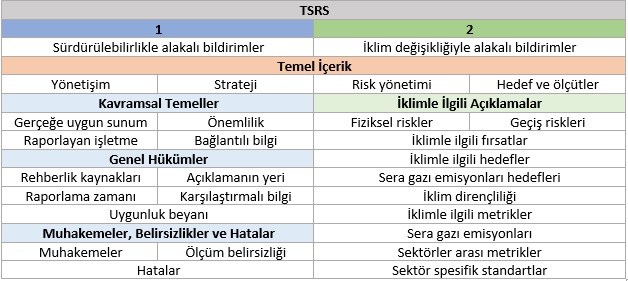Sharing Date6 Sep, 2024

As sustainability becomes increasingly important, sustainability reports are gradually shifting from voluntary to mandatory status, serving as an effective and strong tool for stakeholder communication across numerous sectors. Many large companies are now reporting their commitments and practices in environmental, social, and governance (ESG) areas by following various standards to meet the demands of their key stakeholders. However, the unregulated expansion of cumulative information, often motivated by a superficial “greenwashing” approach, has led to investors encounter reports that lack financial relevance, fail to provide global comparability, and are not subject to auditing. As the sustainability ecosystem rapidly evolves, the benefits of increasingly complex reporting processes, for this very reason, becoming a topic of debate. Ongoing efforts underscore the need for standardization to enhance the effectiveness and credibility of sustainability reporting.
Background
Responding to strong market demand, the International Financial Reporting Standards (IFRS) Foundation announced the formation of the International Sustainability Standards Board (ISSB) at the COP26 conference in Glasgow on November 3, 2021.1 ISSB aims to develop standards to create a global foundation for sustainability disclosures, fulfill investors’ information needs, enable companies to provide comprehensive sustainability data to global capital markets, and facilitate interoperability with disclosures targeted at broader stakeholder groups.2 In this context, the IFRS S13 and IFRS S24 standards were published in June 2023 as the first global documents to standardize sustainability and climate-based reporting.
IFRS S1 and IFRS S2 build on the work of the Sustainability Accounting Standards Board (SASB), Task Force on Climate-related Financial Disclosures (TCFD), Climate Disclosure Standards Board (CDSB), and the Integrated Reporting Framework (IR).5 The standards require companies to present both financial statements and sustainability-related information within the same reporting framework. They aim to implement a 360-degree approach that evaluates the impact of sustainability and climate-based factors on a company’s financial performance, alongside ESG activities.
In Türkiye, these developments have not gone unrequited. With an amendment to the Turkish Commercial Code (No. 6102) on June 4, 2022, the Public Oversight, Accounting, and Auditing Standards Authority (POAPOA) was granted the authority to define and publish Türkiye’s Sustainability Reporting Standards (TSRS) to ensure uniformity in implementation and the international validity of sustainability reporting for designated companies.6 Through an agreement with ISSB, POA has based its standards on IFRS S1 and S2, establishing standards both tailored to Türkiye’s needs and compatible with international requirements. The scope of TSRS implementation was published in the Official Gazette on December 29, 2023, came into force as mandatory for designated companies starting in 2024.7
TSRS 1: General Requirements for Disclosure of Sustainability-related Financial Information8 & TSRS 2: Climate-Related Disclosures9
TSRS 1 requires companies to disclose sustainability-related risks and opportunities, supporting the decision-making of the primary users of general-purpose financial reports (i.e., existing and potential investors, lenders, and other credit providers) in resource allocation. Given the direct relationship between an organization’s cash flow generation capacity over the short, medium, and long term and its entire value chain and ESG axis, sustainability disclosures encompass risks and opportunities that may impact financing access or capital costs. In addition to the core content section, which is central to both reporting and explained further in the following sections, the standards specify the required information and regulatory requirements under the headings of conceptual foundations, general requirements, and judgments, uncertainties, and errors.
- Under the conceptual foundations section, how to present the sustainability-related financial information, which information will be considered important, and methods for referring to related information in other reports are clarified. It also states that the reporting entity’s boundaries should align with those of the financial statements. The main objective is to ensure companies to present sustainability-related risks and opportunities accurately and comprehensively, reflecting these aspects in reported financial positions.
- In the general requirement section, which provides an informative framework for reporting, additional guidance sources for identifying sustainability-related risks and opportunities, suitable report formats (such as activity reports, sustainability reports, or integrated reports), and the timeline for sharing reports are covered. Importing reporting requirements for presentation of all disclosed information in a comparable manner with the prior period and the statement of compliance with TSRS are also covered in detail.
- In the section on judgments, uncertainties, and errors, it is aimed at ensuring the reliability of information, uncertainties that companies may face in sustainability reporting and their impacts on reporting are addressed. Guidelines for managing judgment processes, reporting measurement uncertainties, and correcting prior period errors are provided.
Designed in full alignment with TCFD recommendations, TSRS 2 focuses on climate-related risks and opportunities rather than business-specific information. Following the issuance of IFRS S2, TCFD announced the completion of its mission and disbanded.10 In parallel with TCFD reporting, this standard requires the identification of physical risks, transition risks, and current climate opportunities resulting from climate change, setting greenhouse gas emission targets, and evaluating climate resilience. It is expected to provide clear, comparable, and consistent information on how climate-related factors could impact a company’s financial performance. The ultimate aim is to support informed decision-making for investors and stakeholders by providing a comprehensive perspective on how climate risks and opportunities are managed within the broader business strategy and financial planning.
- The Guide to Sector-Based Application of TSRS 2, published on April 29, 2024, provides businesses with guidance on determining climate-related disclosures and metrics across 68 subsectors. Developed with insights from SASB’s specific standards, the guide offers recommendations on how to measure and report climate risks and opportunities unique to particular business models and sectors. The documents suggest methods for implementing some of the disclosure requirements in TSRS 2 without imposing additional obligations in the reporting process.11
Both of these complementary and similar standards expect the main structure of reports to explain the core content under four main headings:
- Governance: The processes, controls, and procedures used by the business to monitor, manage, and oversee sustainability/climate-related risks and opportunities are explained. The involvement, responsibilities, and competencies of governance bodies regarding these risks and opportunities should be reported in detail.
- Strategy: This section outlines how the business manages sustainability/climate-related risks and opportunities and how these management processes affect the business model and value chain. Transition plans, strategic decisions, and integration of risks into financial planning should be reported, alongside the definition of short-, medium-, and long-term strategies.
- Risk management: The processes for identifying, assessing, prioritizing, and monitoring sustainability/climate-related risks are described in detail. This includes whether scenario analysis and risk ranking methods are employed, as well as how these processes are integrated into the company’s overall risk management framework.
- Metrics and targets: The metrics used to measure the performance of sustainability/climate-related risks and opportunities and progress toward targets are explained. Information on specific metrics and related targets should be provided, including details on the target-setting process, validation of targets, and progress made in achieving them.

Businesses Subject to TSRS, Audit Process, and Trainings
According to the Board Decision on the scope of application, companies regulated and supervised by the Capital Markets Board (CMB), Banking Regulation and Supervision Agency (BRSA), and Insurance and Private Pension Regulation and Supervision Authority (IPRSA), as well as precious metal enterprises operating in the Borsa Istanbul markets, compose the main universe of the reporting scope. Among these, businesses that exceed at least two of the following threshold criteria in two consecutive reporting periods are required to report in compliance with TSRS:
- Total assets: 500 million Turkish Lira,
- Annual net sales revenue: 1 billion Turkish Lira,
- Number of employees: 250.
In determining whether these thresholds have been exceeded, businesses are assessed alongside their subsidiaries and affiliates. Except for banks under the Savings Deposit Insurance Fund (SDIF), all banks subject to BRSA are expected to prepare their sustainability reports in compliance with TSRS, regardless of any threshold values. While optional, businesses outside the scope can also voluntarily report in compliance with TSRS. Certain privileges are provided to facilitate the transition and support the adaptation process. In this context:
- No requirement for comparative information (data from previous years) in the first reporting period,
- Initial reports do not have to be published together with financial reports,
- Scope 3 greenhouse gas emissions disclosure is not required for the first two years,
- If TSRS 2 is applied in the first reporting period, TSRS 1 is not a requirement,
- Businesses that used a method other than the Greenhouse Gas Protocol for measuring greenhouse gas emissions before the first reporting period are not obligated to recalculate emissions based on the Greenhouse Gas Protocol,
- Disclosure of Scope 3 emissions related to financed emissions is not mandatory for businesses engaged in asset management, commercial banking, or insurance activities.12, 13, 14
POA has announced that reports prepared under TSRS will be subject to mandatory assurance audits. Sustainability auditors will conduct audits in accordance with assurance audit standards for sustainability reports, which are complementary to financial reports. This task will be carried out by individuals authorized by the POA and holding independent audit credentials. After the certification exam for sustainability auditors on September 21, 2024, authorization will be granted among successful independent auditors. Following the publication of initial reports in 2025, audit processes will commence in 2026.15
With the rapid adaptation and implementation of standards in Türkiye, there has been a growing need for training on reporting within the organizations in scope. POA has taken action to provide training to individuals responsible and to create a “green-collar” workforce capacity within organizations to educate Corporate Sustainability Reporting Specialists. Candidates who pass a two-module exam covering current sustainability topics and financial reporting approaches will receive a Corporate Sustainability Reporting Specialist license. The training will be voluntary, and relevant programs can be undertaken from institutions meeting the criteria announced by the POA. The list of authorized training institutions and information on the exam are expected to be announced shortly.16
TSRS Compliance Process
TSRS will bring different compliance processes for businesses with and without sustainability reporting practices. Businesses already reporting according to international standards such as the Global Reporting Initiative (GRI), Carbon Disclosure Project (CDP), and Task Force on Climate-Related Financial Disclosures (TCFD), which are based on similar principles to TSRS, are expected to adapt to this process more easily and quickly. Having an established data collection system and knowing which departments to gather specific information from within the organization will be among the main factors facilitating compliance. Businesses should initially compare their existing sustainability or integrated reports with TSRS requirements and identify any gaps. For example, while businesses reporting under GRI may not experience major gaps in governance and strategy areas, however; aspects related to risks and metrics may not fully meet TSRS expectations. Additionally, for metrics not yet monitored per SASB standards, the necessary infrastructure for tracking will need to be established. Regarding financial integration, it will be crucial to form groups where sustainability and finance teams can work together to identify expectations related to financialization. Beginning capacity-building activities promptly to address deficiencies and obtaining necessary support early on will benefit businesses. However, it is essential to prioritize these activities according to the organization’s capacity and priorities, with acknowledging that not all deficiencies can be addressed in the first report.
For businesses without sustainability reporting practices, the process will be much more challenging. These companies must first establish a sustainability management system and define individuals at executive and operational levels within the organization responsible for sustainability and climate-related issues. The primary steps of this system include defining the sustainability governance structure of the business, designing a sustainability strategy based on corporate culture and benchmarks, establishing a system to monitor and audit key performance indicators, identifying sustainability and climate-related risks and opportunities, preparing groundwork for financial integration, establishing data collection foundation for all reporting processes, and developing internal capacity to process and report the data.
The deadline for publishing the first reports is September 2025, allowing businesses time to prepare. However, failing to make the necessary preparations during this period will result negative consequences both legally and reputationally. It would be prudent for businesses to view TSRS not as an obligation but as a long-term strategic necessity. With the implementation of these standards, businesses in Türkiye will have the opportunity to address ESG factors more systematically and strengthen their sustainability approaches. TSRS will not only increase the effectiveness of sustainability reporting but also support businesses’ long-term value-creation capacities, making it impossible to sustain superficial reporting.
Sources
1) IFRS Foundation. (2021). An update on the ISSB at COP26. Accessed at: https://www.ifrs.org/news-and-events/news/2021/11/An-update-on-the-ISSB-at-COP26/
2) IFRS Foundation. (2022). ISSB. https://www.ifrs.org/groups/international-sustainability-standards-board/
3) IFRS Foundation. (2023). IFRS S1: General requirements for disclosure of sustainability-related financial information. Accessed at: https://www.ifrs.org/issued-standards/ifrs-sustainability-standards-navigator/ifrs-s1-general-requirements.html/content/dam/ifrs/publications/html-standards-issb/english/2023/issued/issbs1/
4) IFRS Foundation. (2023). IFRS S2: Climate-related disclosures. Accessed at: https://www.ifrs.org/issued-standards/ifrs-sustainability-standards-navigator/ifrs-s2-climate-related-disclosures.html/content/dam/ifrs/publications/html-standards-issb/english/2023/issued/issbs2/
5) IFRS Foundation. (2023). IFRS Foundation publishes comparison of IFRS S2 with the TCFD recommendations. Accessed at: https://www.ifrs.org/news-and-events/news/2023/07/ifrs-foundation-publishes-comparison-of-ifrs-s2-with-the-tcfd-recommendations/
6) (2023). TSRS Application Scope Published in Official Gazette. Accessed at: https://www.kgk.gov.tr/Portalv2Uploads/files/Notifications/v2/Sustainability/Announcement/Turkiye_Surdurulebilirlik_Raporlama_Standartlari_ve_TSRSlerin_Uygulama_Kapsami_Resmi_Gazetede_Yayimlanmistir.pdf
7) Presidential Directorate of Legal Affairs. (2023). Official Gazette No. 32414. Accessed at: https://www.resmigazete.gov.tr/eskiler/2023/12/20231229M1.pdf
8) (2023a). TSRS 1 General Provisions on Disclosure of Sustainability-Related Financial Information. Accessed at: https://kgk.gov.tr/Portalv2Uploads/files/Notifications/v2/Sustainability/Announcement/(ProcessedResources)_TSRS%201.pdf
9) (2023b). TSRS 2 Climate-Related Disclosures. Accessed at: https://kgk.gov.tr/Portalv2Uploads/files/Notifications/v2/Sustainability/Announcement/(ProcessedResources)_TSRS%202.pdf
10) (n.d.). About TCFD. Accessed at: https://www.fsb-tcfd.org/about/
11) (2024). Announcement on Sector-Based Implementation of TSRS 2. Accessed at: https://www.kgk.gov.tr//Portalv2Uploads/files/Notifications/v2/Sustainability/Announcement/Announcement%20-%20Sustainability%20(002)-.pdf
12) (2024). Board Decision on the Scope of Application of TSRS. Accessed at: https://www.kgk.gov.tr/Portalv2Uploads/files/Duyurular/v2/Kurul%20Kararlar%C4%B1/TMS%20Kurul%20Kararlar%C4%B1/T%C3%BCrkiye%20S%C3%BCrd%C3%BCr%C3%BClebilirlik%20Raporlama%20Standartlar%C4%B1n%C4%B1n%20Uygulama%20Kapsam%C4%B1na%20ili%C5%9Fkin%20Kurul%20Karar%C4%B1.pdf
13) (2023a). ibid.
14) (2023b). ibid.
15) (n.d.). Frequently Asked Questions. Accessed at: https://www.kgk.gov.tr/surdurulebilirlik-sss#collapse5

